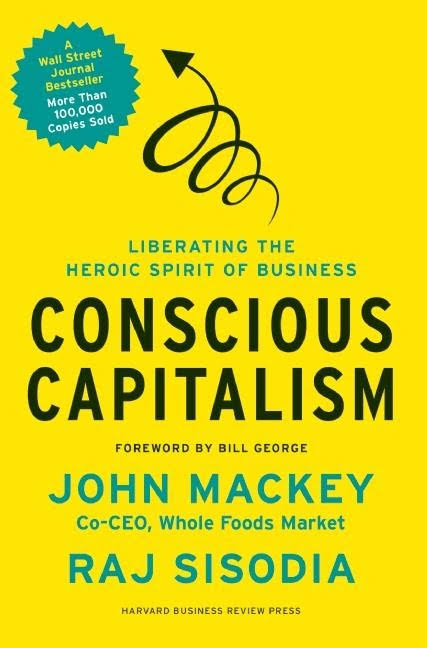Onderstaande tekst is een voorpublicatie uit mijn nieuwe boek over identiteitsmarketing.
Ook het boek van John Mackey en Ray Sisodia met de titel Conscious Capitalism: Liberating the Heroic Spirit of Business uit 2103 vertelt in deels dezelfde en deels andere woorden het verhaal van de betekeniseconomie en identiteitsmarketing. De twee auteurs hebben samen de Conscious Capitalism beweging opgericht met als ultieme doel om de mensheid te verheffen (elevate humanity) door ervoor te zorgen dat alle organisaties gewetensvolle organisaties (conscious businesses) worden. In een haast identieke opzet als Umair Haque hanteert, schetsen de auteurs de hoekstenen (tenets) van conscious capitalism, in dit geval vier in plaats van vijf, en illustreren deze aan de hand van praktische voorbeelden. De vier hoekstenen zijn: hoger doel en kernwaarden, gewetensvolle cultuur en management, gewetensvol leiderschap en stakeholderintegratie. Wat mij vooral trof in dit boek zijn een aantal citaten die precies de kern raken van de betekeniseconomie en identiteitsmarketing. Al lezende hoorde ik af en toe mezelf spreken (in het Nederlands dan uiteraard).
Om te beginnen merken de schrijvers op dat we dringend een ander paradigma nodig hebben met betrekking tot zakendoen omdat ons huidige model niet langer werkt:
“Business as usual” will not work anymore. We need a new paradigm for business, a new philosophy to lead and work by (…) This new operating system for business is in far greater harmony with the ethos of our times and the essence of our evolving beings. Conscious Capitalism is not about being virtuous or doing well by doing good. It is a way of thinking about business that is more conscious of its higher purpose, its impact on the world, and the relationships it has with its various constituencies and stakeholders. It reflects a deeper consciousness about why businesses exist and how they can create more value.
Bedrijven hebben volgens Mackey en Sisodia een sleutelrol om het bewustzijn over gewetensvol zakendoen aan te wakkeren en het nieuwe paradigma te bewerkstelligen, vooral omdat zij de wereld ook opzadelen met de negatieve gevolgen van hun zakelijke activiteiten:
We believe that businesses should lead the way in raising consciousness in the world. The larger the company, the greater its footprint and therefore its responsibility to the world.
Is het ingewikkeld om een gewetensvol bedrijf te zijn? Absoluut niet. De basisfilosofie achter gewetensvol zaken doen (lees: identiteitsmarketing) is buitengewoon simpel:
Conscious businesses have a simple but powerful belief: the right actions undertaken for the right reasons generally lead to good outcomes (…) The lesson is to focus on the things we can control, which are our actions and our reactions, and trust that the right actions will lead to positive outcomes, not always immediately but in the long term.
Kortom: doe de goede dingen voor de juiste redenen en vertrouw erop dat dit op langere termijn tot positieve uitkomsten leidt voor zowel de organisatie als haar belanghebbenden. Beter kun je de essentie van identiteitsmarketing niet samenvatten!
Mackey en Sisodia schrijven ook een aantal rake zaken over het belang van een heldere identiteit. Zij noemen dat higher purpose. Kort samengevat komt het hierop neer: een duidelijk en gedragen identiteit zorgt voor enorme betrokkenheid en verbondenheid tussen alle belanghebbenden van de organisatie. Het zorgt bovendien voor flow in de organisatie (alles klopt en lijkt vanzelf te gaan) en het leidt tot superieure prestaties op alle gebieden. Maar pas op: je moet identiteit wel voortdurend op de voorgrond plaatsen en als uitgangspunt nemen voor alle beslissingen. Zodra je denkt dat het vanzelf gaat, kom je bedrogen uit.
A compelling sense of higher purpose creates an extraordinary degree of engagement among all stakeholders and catalyzes creativity, innovation, and organizational commitment (…) If you have a true purpose and can articulate it with clarity and passion, everything makes sense, everything flows (…) Purpose is something we can never take for granted; the moment we do, it starts to be forgotten and soon disappears. It has to be at the forefront of consciousness (and therefore decision making) literally all the time. When the purpose is clear, leadership teams can make quicker and better decisions. Clarity of purpose also leads to bolder decisions. Rather than adjusting decisions according to the winds of public opinion or changes in the competitive environment, decisions in a purpose-driven company take those things into consideration while also being informed by something more soulful and sturdy. This leads to superior overall performance.

Handige animatie over Conscious Capitalism (7:45 minuten)
Recente reacties